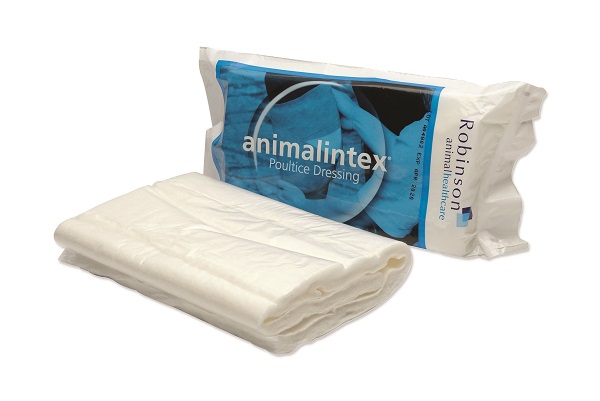Posted: 24th September 2019 | Back to news feed
Animalintex® is a poultice and wound care dressing that is licenced by the Veterinary Medicines Directorate (VMD), meaning it is strictly controlled to ensure efficacy, safety and consistency.
Each poultice contains two active ingredients, Boric Acid to kill infection and promote faster healing, and Tragacanth to draw out dirt and infection and reduce inflammation. This, in combination with different layers of absorbent material, padding and a low adherent wound facing layer creates the proven formulation of Animalintex®.

As a licenced product it can be used to treat a wide range of conditions, including a number of common ailments affecting horses during the winter months.
Abscesses - Foot abscesses are more common in wet weather because the moisture softens horse’s feet, making it easier for foreign objects or dirt to penetrate the hoof. A vet or farrier will need to locate the abscess and drain the pus. Once the pus has been drained the foot must be cleaned, before applying Animalintex® and securing in place with Equiwrap®, to draw out any remaining pus.

Cracked heels – Usually associated with wet conditions, the skin at the back of the pastern becomes inflamed and cracks appear which frequently become infected by dirt and grit. Cleanse the area with boiled water that has been allowed to cool and salt before applying a hot, wet poultice to help remove any scabs, then use a dry poultice as a wound dressing until the skin has healed.
Mud Fever - Commonly seen during winter, mud fever is a bacterial skin infection that can affect your horse’s skin on the heel, fetlock and pastern. In severe cases of mud fever, particularly where there is inflammation, hot poulticing can help to remove scabs, following the same treatment as you would for cracked heels.
Thrush – Standing in wet conditions can predispose some horses to thrush, a bacterial infection of the frog which is categorised by a smelly discharge or soft spots. To treat thrush, ask your farrier to remove all the diseased tissue before cleansing the area thoroughly with 10 parts warm water (ideally boiled first) to one part hydrogen peroxide before applying a hot wet poultice to the area.
Infected wounds – Injuries can happen at any time of year. Contaminated or infected wounds will require the use of a hot poultice to draw out the pus. A hot, wet poultice increases the blood supply to the injured area, providing more oxygen and white blood cells which fight infection. The improved blood flow reduces the swelling whilst the warmth of the poultice relieves the animal of pain, providing comfort.
Whatever the type of injury always remember to change the Animalintex® poultice at least once every 12 hours.
Robinson Animal Healthcare has a wide range of products for all your first aid requirements including the market leading Animalintex®, which is the only VMD licensed multi-layered absorbent poultice available in the UK and the legendary Veterinary Gamgee®.
For more information contact Robinson Animal Healthcare on 01909 735000 or visit www.robinsonhealthcare.com
The Equestrian Index newsfeed is compiled from articles submitted by advertising members and expresses the opinions of those members. Watsons Directories Ltd shall not be held liable for any inaccuracies or mis-statements therein.